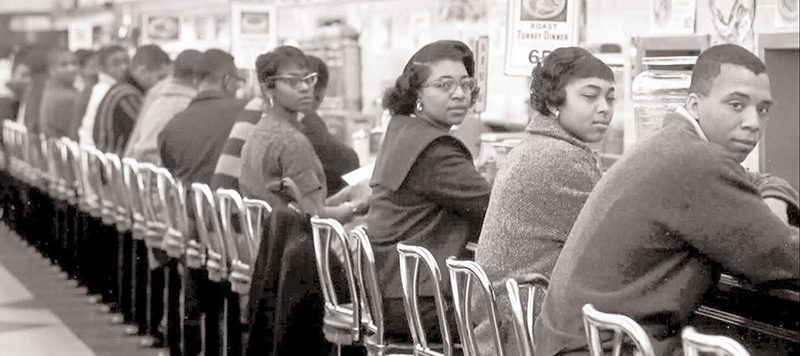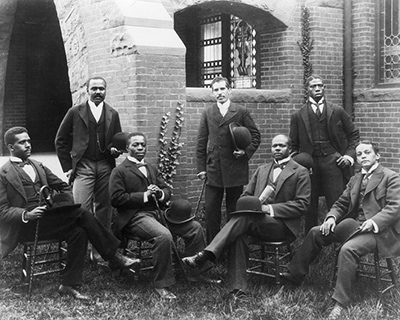Charting New Histories: The Crucial Role of Black Students in Shaping Our Past and Future

History isn’t merely a dry record of past events and dates: it’s a constantly evolving discipline that can tell us a lot about our social, political, and cultural present. For example, the history of colonialism and globalization gives us critical context for understanding the inequities that people in many nations continue to face today. Similarly, understanding historical relationships between different countries and religious and/or ethnic groups provides essential insights into modern geopolitical tensions and alliances.
The study of history can have a profound impact on how we think, behave, and interact with one another. Understanding the warning signs that preceded economic or political crises in the past can help us better anticipate and avoid future conflict or violence. What’s more, studying history is an excellent way to connect to our individual or shared heritages and learn more about the events, factors, and movements that continue to shape us — even if we weren’t alive when they happened.
Why the US Needs More Black History Majors
America’s History of Whitewashing History
Today, Americans are in greater need than ever of gaining a balanced and truthful understanding, not only of our national history as a whole, but the incredibly important role of Black history within it. For many decades, students in grade schools and colleges alike have been taught an institutionalized version of history that focuses heavily on the actions and accomplishments of white male figures while minimizing or misrepresenting narratives around people of other demographics. This practice is known as “whitewashing” history.
Whitewashing has gravely distorted what multiple generations of Americans have understood and currently understand to be true about our past and present. In recent years, this miseducation has led to a dangerous push among right-wing politicians and voters, not only to discredit and devalue Black history, but to actually ban it from grade school level and higher education curricula altogether.
Banning a high-quality education in history would not only be a disservice to students of all races, but would worsen existing civil rights inequities for non-white Americans and other demographics. Ultimately, this would lead to the demise of true American democracy itself.
Improving the Quality of Education, Racial Equity, and Democracy
More Black students pursuing history majors is pivotal in fostering a more comprehensive public understanding of the subject by including perspectives that have previously been marginalized or overlooked. This is true not only of American history, but other aspects of global history as a whole. In addition, this would help to rectify historical underrepresentation in this field, given that as of 2019, just 5% of American history majors were Black.
Making space for Black history in the classroom and elsewhere, as well as increasing the number of Black history majors, is a critical step towards fostering an inclusive, just society. By definition, a just society is one that recognizes and values the contributions of all of its members, including not just people of color, but women, LGBTQ+ individuals, and people of all intellectual and physical abilities. In other words, it is a society that reflects true American values and ideals.
Areas of History to Explore
History is an extremely broad discipline, and as such, historians and history majors often specialize in a specific area of history, whether that’s the history of a particular place, culture, or time period. A few examples include:
- American History
- European History
- The History of Science
- Medieval History
- Ancient History
- Black History
- Women’s and Gender History

LeMoyne-Owen College Students
Careers in History
Majoring in history will allow you to cultivate valuable, transferable skills. As a history student, you’ll learn how to absorb and synthesize large quantities of information, balance contrasting sources and points of view, and develop coherent arguments. History majors by necessity are organized, analytical, and skilled at communication and critical thinking, all of which are valuable qualities in the professional world.
Below are a few of the careers that you might consider with a history degree:
- Historian
- Historic preservationist
- Professor of history*
- Museum curator or administrator
- Archivist
- Teacher
- Writer or journalist
- Politician
- Lawyer*
- Consultant
- Administrative professional
*Require advanced degrees
Whatever your interest, students who plan to pursue careers in history will need to enroll in a related degree program. These may offer different concentrations, and course subjects may include:
- Historical methods
- Ancient civilizations
- Colonial America
- Modern US history
- Middle Eastern history
- European history
- Asian history
- History of World War II
HBCUs Can Help You Start a Career in a History Discipline
Given the recent Supreme Court ruling on affirmative action in college admissions, more Black students are likely to turn to historically Black colleges and universities (HBCUs) for their education. In response, these institutions will do everything they can to meet increased student demand. HBCUs help more students earn college degrees, compete successfully for well-paying jobs in competitive career fields, improve workforce diversity, and increase upward economic mobility.
People of all ages, races, and life paths can help to improve diversity in history disciplines by supporting scholarships and other forms of funding for HBCUs with related programs. You can make a difference in the lives of history students in one easy step by making a donation today.
Want to learn more about history as a possible major or career path? Have questions about which UNCF colleges and universities offer this program? Looking for help with financing this degree?
Click Here So We Can Help You!
How to Prepare for Success

Being a successful history student requires that you have excellent reading, writing, and critical thinking skills. To ensure that you’re prepared when you get to college, try to get as much experience as possible in the following areas:
- English and writing. As a history major, you’ll be doing a lot of reading and writing papers. Being able to interact with dense, sometimes difficult texts and documents and compose compelling research papers is an indispensable skill.
- History and government. Having some background in history and public policy will give you a good foundation, as well as possibly give you ideas for areas you might want to specialize in.
- Psychology. History is, ultimately, the study of people. Having an understanding of how people think and what motivates them to do the things they do can only help enhance your studies.
UNCF Schools to Consider
Many high-ranking UNCF-member schools offer degrees in history, including:
- Tuskegee University
- Spelman College
- Clark Atlanta University
- Xavier University of Louisiana
- Johnson C. Smith University
- Claflin University
- Virginia Union University
- Tougaloo College
- Morehouse College
Professional Organizations

If you’re thinking about majoring in history, it may be helpful to familiarize yourself with some of the programs, membership options, and resources offered by professional organizations. Exploring these will also give you a good idea of the scope and professional opportunities the field has to offer.
- American Association for State and Local History
- American Historical Association
- Association of Native and African History Professionals
- Organization of American Historians
- Society of American Archivists
Scholarships Available
There’s no better way to start on your path toward a successful career in history than with a solid financial foundation. Fortunately, many scholarships are available through UNCF, including some specifically for history majors. Keep an eye on the UNCF website for current scholarship opportunities and announcements.
Search for specific scholarships and view those that are currently accepting applications here! Students should also check with each college or university to see if there are additional scholarships available to study history.
As you explore your options, be sure to use our guide to applying for scholarships and grants. You can also receive guidance by submitting a major interest form if you are interested in a career in history. Submit the form on our website to get started, and follow us on UNCF social media channels to receive notifications about our scholarships and member HBCUs. Reach out today!
You can also show your support for students pursuing careers and furthering equity in history by contributing to UNCF member schools. Education is the greatest tool we have in creating a just and equitable society where truth reigns and economic mobility is available to all. Help us achieve this future by donating today!
- Bennett College
- Bethune-Cookman University
- Claflin University
- Clark Atlanta University
- Fisk University
- Huston-Tillotson University
- Jarvis Christian University
- Johnson C. Smith University
- Lane College
- LeMoyne-Owen College
- Miles College
- Morehouse College
- Oakwood University
- Paine College
- Rust College
- Saint Augustine's University
- Spelman College
- Stillman College
- Talladega College
- Tougaloo College
- Tuskegee University
- Virginia Union University
- Wiley University
- Xavier University of Louisiana
- Feature Article
- Career Ideas
- Funding Your Degree
- Member HBCUs
- Scholarships
- Students